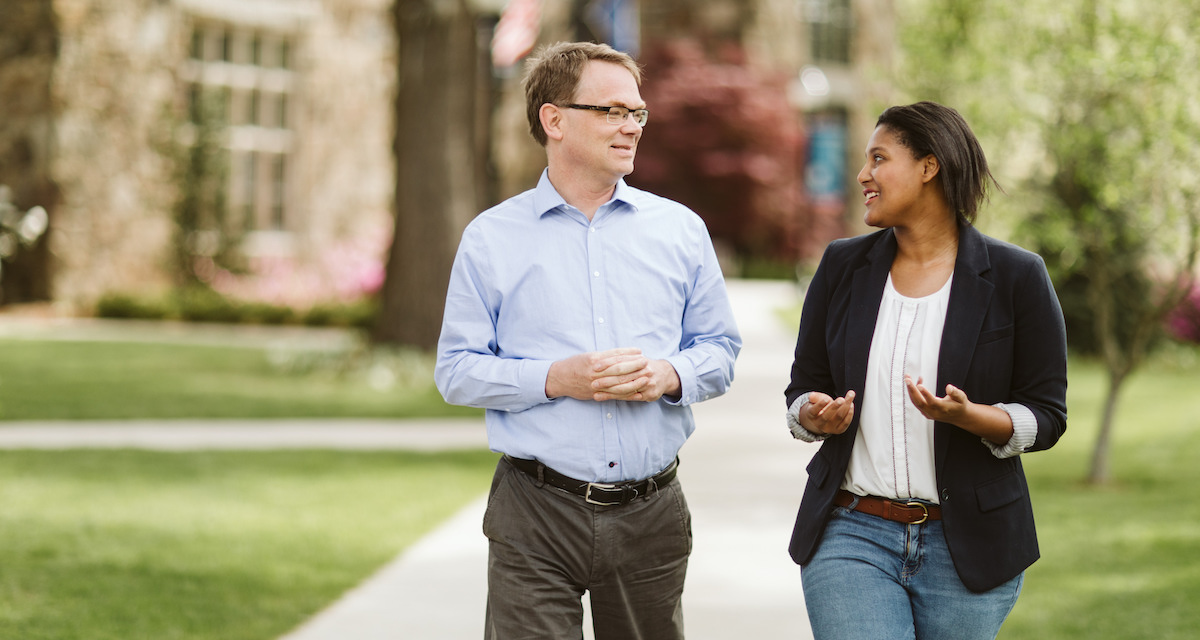Ready for Takeoff: Tips for the Academic Year
When you fly a plane, you check that all your settings and controls are in order. You plan for the flight, making sure you have enough fuel to get you where you need to go, that you have enough snacks and drinks to keep your passengers happy throughout the journey. Right?
Maybe you don’t fly planes, but now that it’s August, you’ll soon be taxiing to the runway of the 2019–20 academic year. Before you know it, you’ll be taking off into eight months of scholastic flight. To prevent turbulence from knocking you off course, we’ve gathered a few pointers from some seasoned pilots of the academic airways. Whether you’re entering the last leg of your schooling, or it’s just the first of a many trips featuring a quirky internship in Arizona and backpacking through Ireland, now’s the time to plan for the journey ahead.
For the first-year student
Jeff Carpenter, Director of Residence Life: “Two things to bring:
- Openness—You don’t understand the world yet. Neither do I. Be willing to have the ways you think about things challenged. Hear other perspectives. In a world obsessed with being heard, with escalating Twitter battles, with nonstop opportunities to make your opinion known—listen. Listening is the piece of civil dialogue which has gone missing in our culture. Be someone who brings it back.
- Patience—College is a time of transition. Social, emotional, academic, physical and spiritual change all combine to offer opportunities for growth. But growth takes time, so have patience.”
Learn more about your first-year experience >
For the returner
Jennifer West, Co-director of The Great Conversation: “Establish a healthy routine with some margin and try to stick to it. Sleep deprivation is a real threat to student health, and it doesn’t have to be. Set yourself a reasonable bedtime and wake-up time, based on how much sleep you need. Make sure you’re also drinking plenty of water and eating regular, healthy meals. I know these sound like basic, maybe silly things, but doing everything you can to remain physically and mentally healthy can help a lot when the stresses of schoolwork and life start to pile up.”
For the seniors
Jonathan Markgraaf ’20: “Let’s face it, first-years pretty much own the campus. By-in-large, their charisma, youthful optimism and genuine excitement will dominate all social areas on campus. As most of them will be tucked away into their typical first-year courses, there may be little opportunity for upperclass students to interact with them in the academic sphere. There are still plenty of other ways to get to know a few . . . if you are going to be living in an apartment, you can start planning now on ways that you can be hospitable.”
For everyone
Chris Carlson ’87, dean of student success: “You can let life just happen to you, or you can imagine those things you’d like to see, do, accomplish, overcome, achieve or enjoy. And if you don’t think, plan and take-action about that thing, then it’s not going to happen. We make things happen if they are important to us . . . The way to move from stagnation to surviving to thriving is in the very stubborn refusal to give up trying—imagining a better thing, conceiving of a way to make that thing possible, and applying yourself to the first steps.”
Neema Kamau ’20: “Get yourself a mentor or someone whom you can talk to and express concerns, share your joys and seek help from. These are often times people who have been at the institution for some time and understand how many systems work. Get coffee or a meal with people in staff members and professors—people want to get to know you and hear your story.”
By Veronica Andreades ’20, English language and literature
 The Bell
The Bell